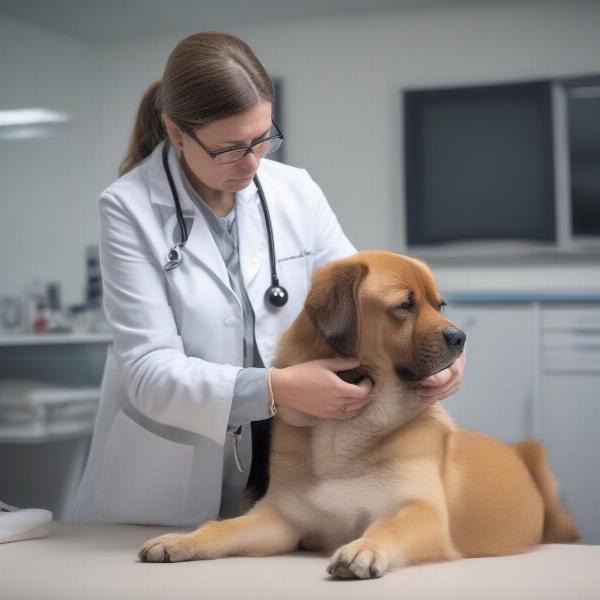Getting antibiotics for your dog without a vet prescription can seem tempting, especially if your furry friend isn’t feeling well and a vet visit isn’t immediately possible. However, administering antibiotics without professional guidance carries significant risks. This article explores the dangers of using dog antibiotics without a vet prescription, highlights the importance of a proper diagnosis, and offers safe alternatives for caring for your dog’s health.
The desire to quickly alleviate your dog’s discomfort is understandable, but using antibiotics without a vet’s prescription can be harmful and even life-threatening. Not all illnesses require antibiotics, and giving the wrong type or dosage can worsen the condition, lead to antibiotic resistance, or mask underlying health problems. A proper veterinary diagnosis is crucial to determining the appropriate course of treatment.
Why a Vet Prescription is Essential for Dog Antibiotics
A vet’s prescription isn’t just a formality; it’s a critical step in ensuring your dog’s safety and well-being. Veterinarians are trained to diagnose illnesses and determine the appropriate medication, dosage, and duration of treatment. They consider your dog’s breed, age, weight, overall health, and the specific infection to tailor the treatment plan.
 Veterinarian Examining a Dog
Veterinarian Examining a Dog
Giving your dog antibiotics without a vet’s oversight can lead to several serious problems:
- Incorrect Diagnosis: Many conditions mimic bacterial infections. Without a proper diagnosis, you risk treating the wrong illness, potentially delaying appropriate treatment and allowing the actual condition to worsen.
- Antibiotic Resistance: Using antibiotics unnecessarily or incorrectly can contribute to the growing problem of antibiotic resistance. This means the antibiotics become less effective against bacteria, making future infections harder to treat.
- Adverse Reactions: Dogs can have allergic reactions or sensitivities to certain antibiotics. A vet can identify potential risks and choose a safe antibiotic for your dog.
- Masking Symptoms: Antibiotics can mask underlying health issues, making it difficult for a vet to diagnose the true cause of your dog’s illness later on.
- Worsening the Condition: Giving the wrong antibiotic or dosage can exacerbate your dog’s condition and lead to more serious complications.
Safe Alternatives and When to Seek Veterinary Care
While antibiotics are essential for treating bacterial infections, many other conditions can cause similar symptoms in dogs. Before considering antibiotics, it’s crucial to consult a veterinarian for a proper diagnosis.
If your dog is experiencing mild symptoms like vomiting or diarrhea, supportive care at home might be sufficient initially. This can include:
- Rest: Ensure your dog gets plenty of rest in a quiet, comfortable environment.
- Hydration: Encourage your dog to drink water to prevent dehydration. You can offer small amounts of electrolyte solutions or unsalted chicken broth.
- Bland Diet: If your dog has an upset stomach, offer a bland diet of boiled chicken and rice.
However, if your dog’s symptoms persist or worsen, or if you notice any of the following, seek immediate veterinary care:
- Lethargy or weakness
- Loss of appetite
- Difficulty breathing
- Bloody diarrhea or vomit
- High fever
- Seizures
What to Expect During a Vet Visit
When you take your dog to the vet, they will perform a thorough physical examination and may recommend diagnostic tests like blood work, urine analysis, or X-rays to determine the cause of your dog’s illness. Based on the diagnosis, they will prescribe the appropriate treatment, which may or may not include antibiotics.
Conclusion
While the desire to help your ailing dog is natural, using dog antibiotics without a vet prescription is dangerous and can have serious consequences. A proper veterinary diagnosis is essential for determining the appropriate course of treatment and ensuring your dog’s safety. Prioritizing preventative care, such as regular check-ups and vaccinations, is the best way to keep your dog healthy and avoid unnecessary antibiotic use. Remember, your vet is your best resource for ensuring your furry friend’s health and well-being.
FAQ
- Can I give my dog leftover human antibiotics? No, never give your dog human medication without consulting a veterinarian. Human antibiotics can be toxic to dogs and may not be effective for treating their infections.
- Where can I buy dog antibiotics without a prescription? Reputable pharmacies and online retailers will not sell antibiotics without a valid prescription from a veterinarian.
- What are the signs of an allergic reaction to antibiotics in dogs? Signs of an allergic reaction can include facial swelling, hives, vomiting, diarrhea, difficulty breathing, and seizures. Seek immediate veterinary care if you suspect your dog is having an allergic reaction.
- How long does it take for antibiotics to work in dogs? The time it takes for antibiotics to work varies depending on the type of infection and the individual dog. You should start to see improvement within 24-48 hours, but it’s important to complete the entire course of antibiotics prescribed by your vet.
- What can I do if I can’t afford a vet visit? Contact your local animal shelter or humane society. They may be able to offer resources or low-cost veterinary care options.
- Are there natural alternatives to antibiotics for dogs? While some natural remedies may help support your dog’s immune system, they should not be used as a replacement for veterinary care, especially for serious infections.
- Can I use expired antibiotics for my dog? No, never use expired medication. Expired antibiotics can lose their effectiveness and may even be harmful.
ILM Dog is your trusted resource for expert advice on dog care and well-being. We offer a wealth of information on various aspects of dog ownership, including breed selection, health and medical care, training, nutrition, grooming, and much more. Whether you’re a new dog owner or a seasoned pro, ILM Dog is here to support you every step of the way. Contact us today for personalized guidance and expert advice. Email: [email protected] Phone: +44 20-3965-8624.